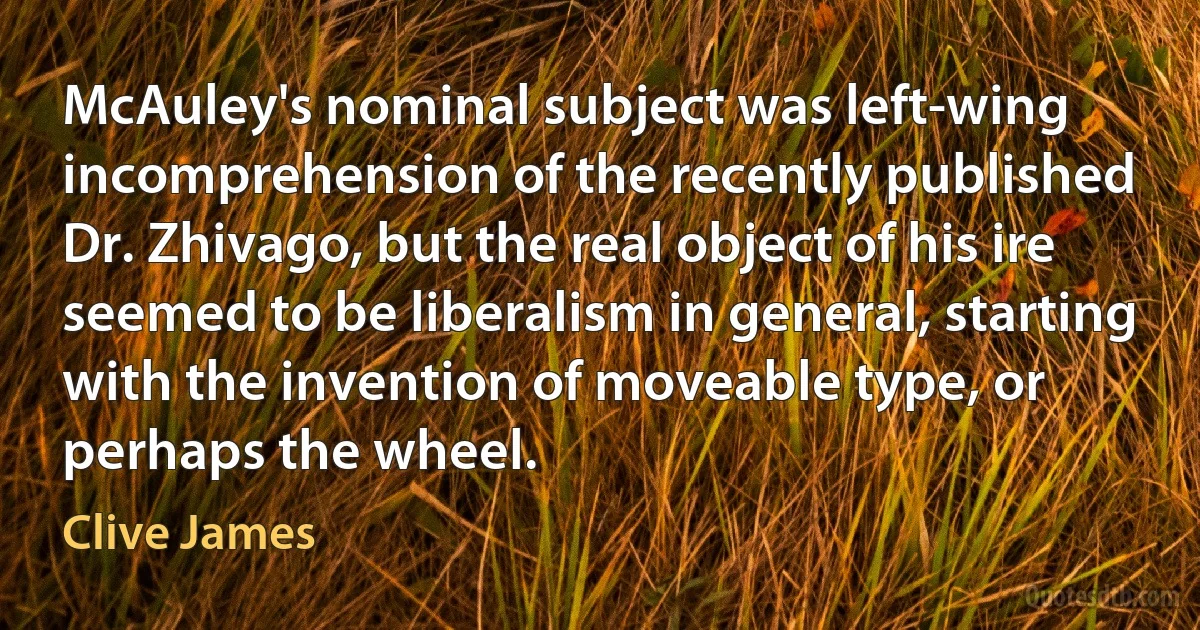Clive James quotes - page 6
[I]t makes no sense whatsoever to call the perpetrators of the Holocaust 'the Germans' if by that is meant that the German victims of Naziism – including many Jews who went on regarding themselves as Germans to the end of the line – somehow weren't Germans at all. That's what the Nazis thought, and to echo their harebrained typology is to concede them their victory.

Clive James
Claus Graf von Stauffenberg's famous last words Es lebe das geheime Deutschland have turned out to be not quite so romantically foolish as they sounded at the time. If there never was a secret Germany, the July plotters at least provided a sacred moment, and the Germans of today are right to cherish it.

Clive James
For those who would like to throw off the burden of history and move on, Goldhagen's book has been a welcome gift. Purporting to bring the past home to the unsuspecting present, he has had the opposite effect. If he has not yet asked himself why his book has received such an enthusiastic reception in Germany, he might ponder why 'the Germans' should be so glad to be supplied with the argument that their parents and grandparents were all equally to blame because they inhabited a culture blameworthy in itself: we're different now. But nobody is that different now, because nobody was that different then.

Clive James
Unreliable Memoirs was just too hard to classify: most of the first wave of American reviewers had convicted it of trying to be truthful and fanciful at the same time. Since I had clearly had no other aim in mind, I read these indictments with sad bewilderment. The most powerful reviewer, in The New York Review of Books, had seized on my incidental remark 'Rilke was a prick' in order to instruct me that Rilke was, on the contrary, an important German poet.

Clive James
Back in the late 1950s, on the sleeve of the Beyond the Fringe record album, Jonathan Miller made a dark joke about his worst fear: being tortured for information that he did not possess. The assumption behind the joke was that if he had something to reveal, the agony would stop. He was looking back to a world of polite British fiction, not to a world of brute European fact. In the Nazi and Soviet cellars and camps, people were regularly tortured for information they did not possess: i.e. they were tortured just for the hell of it.

Clive James
Attempting to define the sensationalism of the press, Malcolm Muggeridge came up with the slogan 'Give us this day our daily story.' A doomed effort, because all it did was remind the reader that the King James Version of the Lord's Prayer was better written than an article by Muggeridge.

Clive James
[H]e could never have played the hero, because for him it was creativity itself that had the heroic status, beyond politics, beyond patriotism, beyond even personal happiness. It's the reason why his work is like that. His poetry, so wonderful when it is really flying, isn't trying to tell you how much he knows. It's giving thanks for how much there is to be known.

Clive James
[Donald Horne's] central tenet, that his homeland was a lucky strike consistently mismanaged by second-rate politicians, caught on as a dogmatic aid to national self-doubt. As I read on through our recent and gratifyingly rich heritage of commentary and memoir, it became clearer to me all the time that we hadn't become a prosperous and reasonably equable democracy by the accidental dispensation of benevolent nature and a favourable geographical position. The country had been built, by clever people. Our constitution itself was the work of people who had studied history. They were readers of newspapers and periodicals, they were eternal students in the best sense, they were bookish people. They had built a bookish nation. But, as so often has been the case with Australia's consciousness of itself, the problem was to realise it.

Clive James


